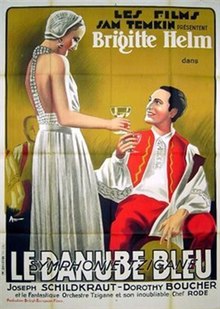The Blue Danube (1932 film)
| The Blue Danube | |
|---|---|

|
|
| Directed by | Herbert Wilcox |
| Produced by | Herbert Wilcox |
| Written by | Miles Malleson |
| Based on | story by Doris Zinkeisen |
| Starring | |
| Music by | Alfred Rode |
| Cinematography | Freddie Young |
| Edited by | Michael Hankinson |
|
Production
company |
|
| Distributed by | Woolf & Freedman Film Service (UK) |
|
Release date
|
|
|
Running time
|
72 minutes |
| Country | United Kingdom |
| Language | English |
The Blue Danube is a 1932 British romance film directed by Herbert Wilcox and starring Brigitte Helm, Joseph Schildkraut and Desmond Jeans. Its plot, based on a short story by Doris Zinkeisen, concerns a Hungarian gypsy who leaves his girlfriend for a countess, but soon begins to suffer heartache.The Blue Danube was made in both English and German-language versions.
In a Hungarian gypsy encampment, carefree Sandor (Joseph Schildkraut) lives with his beautiful sweetheart Yutka (Chili Bouchier). Into their lives rides a blonde countess (Brigitte Helm), with whom Sandor becomes infatuated.
Yutka soon flees from her faithless lover. Sandor roams the country, searching for his lost love, but finds her too late — she now wears furs and has her own aristocratic love—and Sandor returns heartbroken to his Romany encampment.
In contemporary reviews, Frank Nugent in The New York Times wrote, "The chief merit of "Blue Danube," a British film now showing at the Fifty-fifth Street Playhouse, is its presentation of Alfred Rode and his Royal Tzigany Band, a group of eighteen Hungarian gypsy musicians. They play the famous Strauss waltz, some melodies by Liszt and a guitar song of Mr. Rode's composition. Not being a music critic, nor possessing one's technical vocabulary, this corner must be content to report that the selections are played in a manner that sets one's blood to pounding. But Mr. Rode and his band are not all the story of 'Blue Danube.' To be exact, they are little of it, and the rest is a sorry tale of poor editing, incoherence and an overwrought performance by Joseph Schildkraut." The critic concluded that "there is nothing in the film's acting, direction or tempo to arouse enthusiasm."
The Monthly Film Bulletin described the film as "very dated" and that it "must not be looked on as a typical example of Herbert Wilcox's production". The review concluded that neither the sound or photography were "up to modern standards".
...
Wikipedia
